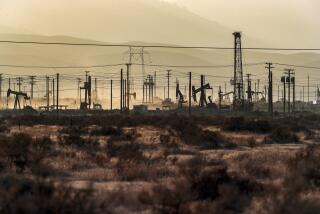L.A. County leaders oppose plan to drill for oil in Whittier hills
- Share via
Los Angeles County leaders voted unanimously Tuesday to oppose a plan to drill for oil in publicly owned parkland in the Whittier hills, saying the proposal would undermine open space protection throughout the county.
“Oil and open space don’t mix,” Supervisor Gloria Molina said after the vote, noting that the land was purchased with taxpayer money earmarked for conservation efforts. “We’ve purchased hundreds of acres of land across Los Angeles County using millions of Prop. A dollars. To allow oil drilling on land in Whittier acquired with Prop. A monies would set a dangerous precedent. We cannot allow it.”
The vote, which came after an hours-long hearing, will not be the last word on the proposal by Matrix Oil Co. Neither the Santa Barbara company nor the city of Whittier, which approved the agreement, recognizes the county’s authority, and litigation is underway.
The city of Whittier did not send anyone to the meeting. In an interview while on vacation in Hawaii on Monday, Whittier Mayor Bob Henderson dismissed the Board of Supervisors’ intention to intervene, saying, “The courts have jurisdiction over this matter, not the county.”
“They don’t have status to hold this hearing; it’s not been requested by us,” he said. “They don’t have a written procedure for doing this and apparently are making it up as they go along.”
The dispute is over whether the city has the right to allow development on 1,280 acres it purchased in 1994 with about $17 million of Proposition A funds, which were intended for conservation purposes.
Until now, the more than 21,000 acres of open space and parklands created countywide with Proposition A money has never hosted a business larger than a taco stand or boat concession.
The controversy erupted in 2008 when oil prices soared past $100 a barrel, prompting the Whittier City Council to vote to lease a small portion of the swath of oak forests and coastal scrub — seven acres — for 30 years to Matrix. In exchange, the city of 90,000 people would receive royalties of up to $100 million a year — roughly twice Whittier’s current budget.
Under terms of the lease, Matrix would use slant-drilling technology to tap an estimated 20 million barrels of recoverable oil.
Opponents contend that extracting oil is a blatant abuse of Proposition A money intended to preserve the land in eastern Los Angeles County’s undeveloped hill country. Conservationists also worry that jurisdictions statewide may attempt to follow Whittier’s example, undermining the intent of propositions designed to use tax dollars to preserve open space.
More than 130 people turned out for Tuesday’s hearing, with the majority of those who spoke imploring the Board of Supervisors to oppose the project.
Sherilynn Reyes, a resident of Whittier, began weeping and recited a song she had written about the hills before pleading with the board to leave the open space as it is.
“My heart belongs to the Whittier hills,” she said. “Don [Knabe] is my district representative, please hear my plea. It not only reduces property values, it is a danger to our environment and our little animals who have no voice. I am here to say I am their voice.”
Supporters waved signs with pictures of a hillside speckled with oil rigs, an ominous dark sky and mournful-looking rabbits and deer.
But Whittier officials believe that they are legally entitled to the oil because the city retained the mineral rights, even if the land was purchased with county bond money. Officials with Matrix argued that the supervisors did not have jurisdiction and had already decided their vote before holding the hearing. They also said that the county’s environmental consultant provided a misleading overview of the project.
“This is a project that will create thousands of jobs … and billions of dollars from royalties,” company President Johnny Jordan said.
That money will be used to purchase more open space and create additional wildlife habitat, he said. “All this from a seven-acre site tucked away in a canyon out of sight from housing.”
More to Read
Sign up for Essential California
The most important California stories and recommendations in your inbox every morning.
You may occasionally receive promotional content from the Los Angeles Times.












